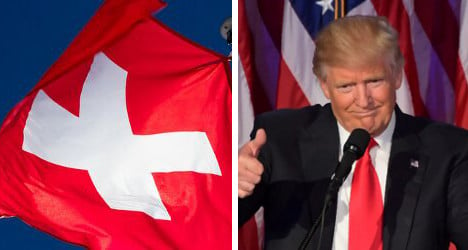Economic uncertainty
The US is Switzerland’s second largest trading partner, so Trump’s criticisms of free trade could have implications for the country’s economy.
While the Swiss foreign minister Didier Burkhalter said in November he is ready to work constructively with Trump’s administration, he stressed in an interview with SRF that “protectionism is not in our interest”.
Speaking to The Local, Jonathan Clay, the US-Swiss managing director of business consultancy Swiss Approach, said: “The simple fact is that we don't know what the effect of his policies will be, because he has only alluded to them in vague terms, or contradicted himself, or exaggerated for effect.”
“Certainly, if the situation in the US becomes even more volatile, for example with social unrest, it will have a negative effect on the economy, and consequently will add risk to doing business in the US. The global markets react in real time, with US futures dropping as the election results were reported. Markets hate uncertainty, and we must be expect this in the near future.”
But Clay is hopeful that companies in Switzerland will keep calm and carry on. “I think the Swiss business community is quite pragmatic and will find ways to deal with a Trump-led America on a business level, regardless of how they feel personally about his politics.
“This underscores the need for businesses, now more than ever, to think creatively and reshape themselves to be agile enough to deal with the kind of turbulence that has become the new normal.”
A boost to populism in Europe – and Switzerland.
“It’s the victory of populism that worries me the most,” Michel Girardin, a macroeconomist at Geneva University, told news agencies after Trump was elected, adding that he feared “contagion” in other countries including France, which will hold elections later this year. Indeed, Marine Le Pen, leader of France’s National Front, hailed Trump’s win as “good news” for France, and many feel his victory will give Le Pen the belief she can become the French president next May.
In Switzerland, the right-wing, anti-immigration Swiss People’s Party (SVP) gained record seats in the parliamentary elections in September 2015.
Trump’s win could “reinforce” eurosceptic and nationalistic tendencies within Switzerland, “which will influence the debate on free movement and national preference [within the job market],” Oscar Mazzoleni, a political scientist at Lausanne University, told the Tribune de Genève.
Though this debate is nothing new in Switzerland, “polarization could increase”, he feels, though it depends how political parties here react to this political change in America.
A threat to international collaboration in Geneva
As the European headquarters of the United Nations and countless NGOs, Geneva’s international community is founded upon collaboration, bringing countries together to tackle global challenges such as migration and climate change.
Trump’s isolationist stance is in direct opposition to this, and his election is causing real worry in the Swiss city, wrote Le Temps.
“Trump’s election will weaken the western camp,” one diplomat told the paper. “Europeans have values in common with the US, Canada and certain Latin American countries but we are becoming fewer and fewer,” he said.
“In his speeches, Donald Trump speaks a lot about power but very little about law and multilateralism,” American political scientist Daniel Warner told the paper.
The city often acts as intermediary in peace negotiations, too, bringing opposing sides together on Swiss soil.
In his interview with SRF foreign minister Burkhalter stressed Switzerland’s commitment to global peace and security and the need for the US to be involved.
“The world needs an America that is committed to peace in the world,” he said.
Switzerland could look attractive to US companies
If a climate of uncertainty continues in the US, that could be good for Switzerland in some ways, feels Clay of Swiss Approach.
“If things don't settle down, I can imagine an influx of American firms that are geographically flexible, who are looking for a stable, central location in which to base their businesses,” he told The Local.
“So we may see more Americans coming to Switzerland indirectly via that route. With recent developments including this election, we expect to see an uptick in such activity.”
Rising Swiss house prices and low interest rates
According to Zurich-based mortgage advisors moneypark.ch, the uncertainty surrounding Trump’s policies could be good news for homeowners in Switzerland as investors look to plough their money into property.
“The new risks are a good argument to invest more in gold and solid currencies [such] as the yen or the Swiss franc”, Stefan Heitmann, CEO and founder of MoneyPark, said in a statement. “And it also speaks for a continuously high attractiveness of real estate.”
Trump’s election in November also influenced Swiss mortgage rates, with market uncertainty in the US pushing the Swiss National Bank to keep interest rates low.
“In effect, Swiss mortgage rates will most likely stay low for many months, if not years,” says Heitmann. “Much to the joy of the Swiss home owners.”
A version of this article was first published in November 2016.




 Please whitelist us to continue reading.
Please whitelist us to continue reading.
Member comments